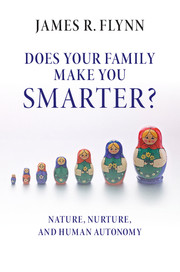Book contents
- Frontmatter
- Dedication
- Epigraph
- Contents
- List of figures, tables and boxes
- Acknowledgments
- Part I Human autonomy
- 1 Twins and autonomy
- 2 Justice and freedom
- 3 The great debate
- 4 Slow and quick decay of family effects
- 5 Reconciliation with twins and adoptions
- 6 The fairness factor
- Part II Intelligence
- For scholars who wish to use the Age-Table Method to measure family effects in nations other than the USA
- Appendix I Wechsler Vocabulary and description of method of analysis
- Appendix II Stanford-Binet Vocabulary
- Appendix III Raven's Progressive Matrices
- References
- Name index
- Subject index
6 - The fairness factor
from Part I - Human autonomy
Published online by Cambridge University Press: 05 June 2016
- Frontmatter
- Dedication
- Epigraph
- Contents
- List of figures, tables and boxes
- Acknowledgments
- Part I Human autonomy
- 1 Twins and autonomy
- 2 Justice and freedom
- 3 The great debate
- 4 Slow and quick decay of family effects
- 5 Reconciliation with twins and adoptions
- 6 The fairness factor
- Part II Intelligence
- For scholars who wish to use the Age-Table Method to measure family effects in nations other than the USA
- Appendix I Wechsler Vocabulary and description of method of analysis
- Appendix II Stanford-Binet Vocabulary
- Appendix III Raven's Progressive Matrices
- References
- Name index
- Subject index
Summary
Questions
(1) Do parents attempt to give all of their children roughly the same quality of cognitive environment?
(2) Which cognitive abilities are most influenced by their efforts?
The Age-Table Method provides some evidence, which, as far as I know, is novel. It measures the extent to which parents try to give their preschool children environments of equal cognitive quality, despite the fact that their children differ in giftedness.
Both the Stanford-Binet and the Wechsler tests (thanks to the Wechsler Pre-Primary Scale of Intelligence or WPPSI) allow us to partition variance among very young children who are still almost entirely conditioned by the home environment their parents provide. Given the high values for family effects at age 7, Vocabulary already at 65 percent and Similarities verging on complete dominance, we would anticipate that family would overwhelm genes among younger children. Bouchard (2013) was correct when he speculated that the variance explained by genes among preschoolers would be minimal. When the brain begins to cognize, family effects may be as high as 80 percent, with the rest split between genes and uncorrelated environment (chance factors like infant illness). Indeed, genes probably account for less than 10 percent.
This means that the direct effects of genes on individual differences in brain physiology may be slight. This fact has implications for scans of the infant brain (magnetic resonance), assuming we want to predict which brain has the most genetic potential. It would be as difficult as looking at two healthy seeds under a microscope and predicting which would grow into the taller plant. This in no way dismisses the potency of whatever genetic differences exist. However subtle they may be at birth, during the course of any normal life they are capable of matching quality of environment so as to produce a combination that differentiates all the levels of cognitive achievement we see around us.
The evidence
When we apply the method to preschool data, we find disadvantages and advantages that put family variance above 80 percent, even values so great that genetic influence would be entirely absent.
- Type
- Chapter
- Information
- Does your Family Make You Smarter?Nature, Nurture, and Human Autonomy, pp. 73 - 80Publisher: Cambridge University PressPrint publication year: 2016



